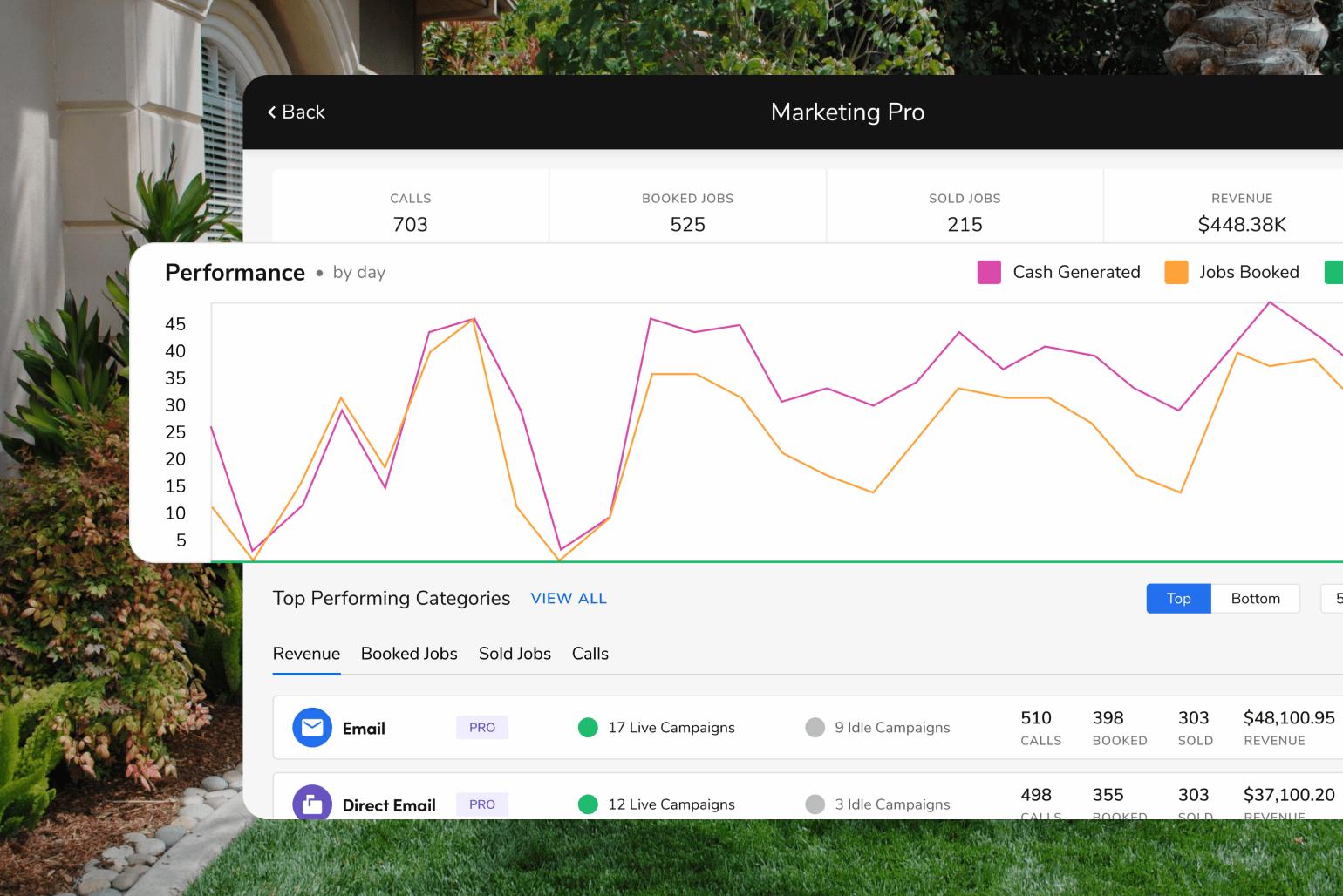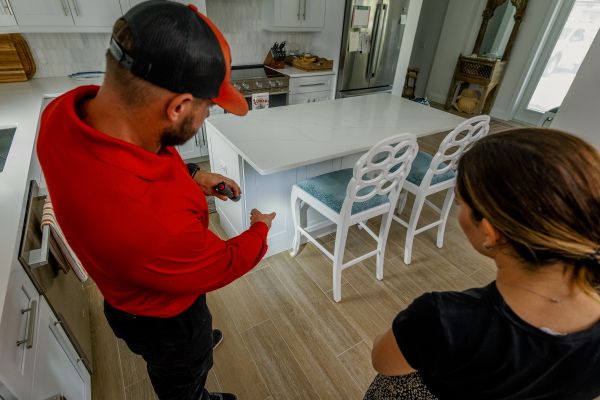How to Improve Customer Service in Your Pest Control Business

Providing excellent customer service helps pest control companies build value, establish long-term client relationships, and grow revenue.
While pest control owners often view customer support as a cost center for the business, effective customer service can expand profitability. According to consulting giant McKinsey & Company, improving customer service increases sales by 2 to 7% and boosts profitability by 1 to 2%.
In this guide, discover how to drive revenue and increase customer loyalty by effectively responding to complaints with a well-trained team.
How to Measure the Effectiveness of Your Pest Control Customer Service
According to the American Customer Satisfaction Index, customer satisfaction surged to an all-time high across the U.S. economy by the end of 2023 after reaching its lowest point two years ago. Companies with high levels of customer satisfaction also tend to gain higher profit and revenue growth.
Which metrics should you track to ensure your team delivers excellent customer service on every job? Here are several key performance indicators (KPIs) to help gauge effectiveness:
Average ticket
Membership conversion rate
Closing percentage
Call booking rate
Follow-up on unsold estimates
Equipment and material cost percentage
Lead turnover percentage
Tracking these KPIs requires constant oversight of your expenses and customer outcomes. FieldRoutes, a field service management software, helps companies measure all aspects of customer service performance with an interactive dashboard that automatically collects and analyzes real-time data on your most important KPIs.
Strategies to Improve Customer Service in Your Pest Control Business
After implementing measurement strategies, pest control companies determine how to use the KPI reporting data to enhance support and give customers peace of mind when doing business with you.
First, identify your top pain points. Which customer support challenges require the most focus in your organization? Some common ones to consider include:
Dealing with customer complaints in online reviews, over the phone, and in person.
Maintaining high-quality service standards across different technicians and service visits.
Balancing customer service with other demands of providing quality pest control services.
Training staff to handle various customer service scenarios more effectively.
After evaluating your needs and identifying shortcomings, consider these six strategies for improving your pest control customer service.
1. Address customer complaints promptly and professionally
Common customer complaints often result from ineffective treatments, scheduling conflicts, and poor communication. And a lack of timely and clear communication exacerbates customer dissatisfaction.
Addressing complaints begins with acknowledgment. For example, if pest problems persist despite treatment, offer follow-up services at no additional cost. If scheduling errors occur, immediately reschedule and apologize for the mistake.
Effective communication, like providing updates via text or email, keeps customers informed and engaged throughout the resolution process. FieldRoutes empowers your team’s communication skills through automatic notifications, two-way messaging via the mobile app, and customer information and service history at their fingertips.
After all, customer support is a team sport involving everyone from CSRs to pest control technicians and their managers. Offer training programs to manage challenging situations using crucial skills like:
Active listening: Fully understand the customer's concern.
Empathy: Work to see the situation from the customer’s point of view.
Deescalation: Acknowledge the customer's frustration and defuse tension.
Problem solving: Propose effective solutions quickly and confidently.
Through comprehensive training in customer care, every team member learns to resolve complaints quickly and professionally. Knowing these strategies helps your employees turn negative interactions into opportunities to build loyalty and trust.
2. Practice proactive communication
Don’t wait until poor communication creates problems in your customer relationships. There’s no wrong time to give your team tools and training to be more effective communicators.
Focusing on proactive communication — sharing information before it’s requested, sending reminders, and following up — goes a long way. Some options include:
Appointment reminders: Ensure clients are ready for scheduled services by sending reminders via text, email, or automated calls.
Service updates: Push notifications during and after you provide pest control services with updates on the treatment plan to encourage transparency.
Educational materials: Offer pamphlets or online resources to teach customers about pests, prevention tips, and treatment methods.
Implementing these strategies effectively fosters confidence in the pest control provider. Trust enhances the overall customer experience and promotes repeat business. That’s important because acquiring new customers is exponentially more expensive than keeping current clients happy.
FieldRoutes empowers customer happiness by simplifying automated communications, such as appointment confirmations. On-board marketing tools also help you remain top of mind for customers so they’re aware of any new offerings, deals, or how to request a free quote.
3. Train staff to deliver outstanding customer service
Whether serving long-term or new customers, train your team never to ignore a complaint. Commercial and residential pest control clients may express dissatisfaction about different things, but, in the end, they simply want a pest-free facility with no active infestations.
Train your pest control company’s staff to enhance customer care. In customer service roles, mastering essential skills like communication, product knowledge, and problem-solving is key to improving the customer experience.
Effective communication ensures clarity and empathy when addressing customer concerns.
Deep product knowledge enables staff to provide accurate information and recommendations.
Problem-solving abilities empower employees to tackle issues efficiently, enhancing customer satisfaction.
Investing in staff training and development makes your team feel valued and cultivates a skilled and confident customer service team ready to increase customer satisfaction and loyalty
4. Use tools & technology to streamline customer service processes
Delivering great customer service and retaining customers requires more than people skills. Field service management software supports alignment across your entire pest control company so everyone, from techs in the field to CSRs in the office, delivers high-quality, consistent customer experiences.
FieldRoutes® Operations Suite offers businesses of all sizes a robust, scalable platform. The cloud-based software helps you manage all aspects of the customer experience:
Answer questions: Route questions to the appropriate person or department.
Flexible scheduling: Customers can select appointment and follow-up times online.
Notifications: Send appointment reminders and work plan updates.
Support features: Track customer support tickets through resolution.
Precision marketing: Reach clients effectively with automation and personalization.
Straightforward invoicing: Simplify billing and clarify the job performed with built-in, customizable invoice creation tools.
An on-board CRM empowers teams to personalize customer service. FieldRoutes supports your ability to monitor KPIs and continually enhance your approach to customer care. As a result, outcomes improve, and your pest control company’s reputation gets a boost with each positive customer service interaction.
5. Offer personalized service
Your team tailors its services to customers when treating cockroaches, bed bugs, fleas, and wasps and providing termite control. But too often, customer service is treated as a one-size-fits-all strategy.
Personalizing communication and service for pest control clients involves tailoring every aspect of the customer experience, from customized treatments and pest management plans to remembering customer preferences and serving up profile-specific marketing content.
Noting pest control customer preferences, such as preferred communication methods or scheduling preferences, demonstrates attentiveness and fosters a sense of rapport. Additionally, offering customized service plans based on property size, pest severity, and budgetary constraints provides clients with tailored solutions that meet their unique needs.
Selecting powerful field service management software helps business owners overcome challenges. The software platform automatically stores customer data and preferences, giving your team the data they need to deliver services consistently. Personalizing the experience provides value from initial inspection throughout the customer's life cycle.
6. Establish customer feedback mechanisms
Pest control companies gather valuable customer feedback through surveys, reviews, and follow-up calls. Surveys, whether conducted online, via email, or in person, allow customers to express their satisfaction levels and highlight areas for improvement.
Reviews on platforms like Google, Yelp, or social media provide public feedback that influences potential clients' decisions. Follow-up calls after service completion demonstrate thoughtfulness. More importantly, they allow customers to share any concerns or suggestions directly rather than venting online.
Analyzing this feedback allows companies to make informed decisions and implement changes that align with customer needs. For instance, if surveys consistently highlight issues with scheduling, the company knows it needs to adjust its appointment system.
Positive reviews praising technician professionalism can lead to additional training in customer interaction. Pest control businesses can continuously improve their services and enhance customer satisfaction by actively listening to feedback and taking actionable steps.
Ready to Level Up Your Pest Control Customer Service?
Investing in effective customer service pays off in dividends. Research shows that 80% of customers will forgive brands for a bad experience if they receive good customer support to resolve it. In addition, 94% say a positive customer service experience makes them more likely to do business with the provider again.
For pest experts, focusing on support accomplishes more than increasing customer satisfaction. It grows revenues and ensures your company continues to thrive.
FieldRoutes Operations Suite enables excellent customer service. Schedule a free demo to learn how.





